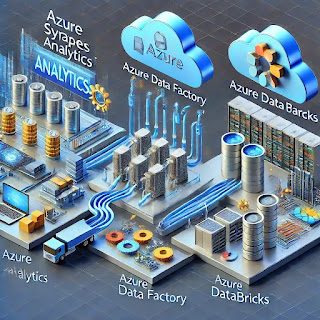Comparision between Azure Synapse Analytics to Azure Data Factory and Azure Databricks

Azure Synapse Analytics, Azure Data Factory, and Azure Databricks are all powerful data services within the Azure ecosystem, but they serve different purposes and cater to different stages of the data engineering and analytics lifecycle. Here’s a comparison of the three services based on key features, use cases, and their differences. 1. Purpose and Role in Data Workflows Azure Synapse Analytics : A unified analytics platform that combines data integration , data warehousing , and big data analytics in a single environment. It offers SQL-based analytics (SQL Pools), big data processing (Apache Spark), and serverless SQL querying over data lakes. Primary focus: End-to-end analytics , enterprise-scale data warehousing , and big data analytics . Azure Data Factory : A data integration and ETL (Extract, Transform, Load) service that allows you to move, transform, and orchestrate data between different so...



